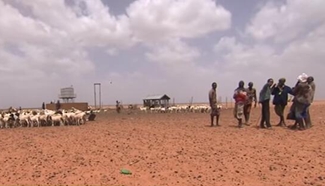DUBAI, Feb. 12 (Xinhua) -- Christine Lagarde, the Managing Director of the International Monetary Fund (IMF), called here on Sunday at the second annual Arab Fiscal Forum on Arab states to implement five to 10 year revenue targets and to share reliable data on tax collection revenues in order to reduce borrowing costs.
Lagarde said in her key note titled "Generating Public Revenue to Build Resilient Economies" addressing ministers of finance from the Arab countries "need to build resilience" in the face of global uncertainty and questions about geopolitical developments "in many regions of the world."
Lagarde said "a good first step is establishing a five-to-ten-year revenue target. After that, a comprehensive reform plan is necessary, aiming at long-term institution building rather than short-term fixes."
Revenue targets, she added, are essential goal posts that can "help you align your revenues with your spending - both in the short term and the medium term."
As a reference country, Lagarde mentioned Algeria, a major oil and gas exporting nation, "where the 2017 budget law for the first time includes a medium-term framework that sets revenue and spending targets for the next three years."
In the oil-exporting countries, this means diversifying the sources of revenue away from oil and gas, she explained, praising countries in the Arabian Gulf region for introducing a harmonized value-added tax (VAT) of five percent on most goods and services in 2018.
"These efforts - which the IMF has supported through its technical assistance - could raise anywhere from one to two percent of GDP, assuming a VAT rate of five percent," said Lagarde.
Over time, governments may also consider deriving additional revenue from income and property taxation, she added.
Personal income is not taxed in the Gulf Arab oil states, while profits of corporations are modestly taxed in some cases (in the Arab fiscal forum's host country United Arab Emirates e. g., foreign banks pay a 20 percent tax on their profits).
The IMF's experiences in other regions underscore the positive impact of diversification, she said, mentioning "Mexico, for example, was able to boost its non-oil tax revenue by more than three percent of GDP - by broadening the VAT base and raising energy taxes and personal income tax rates."
In the oil-importing countries the key priority is to generate higher revenue by broadening the base of existing taxes, she said. "Such reforms would make tax systems simpler, more efficient, and more equitable," according to Lagarde.
Delivering reliable data are essential for the well-being of all Arab countries, she emphasized, "because they increase the accountability of governments and because they can boost the resilience of their economies, including lower borrowing costs."
In October 2016, the IMF said it estimated that the total gross debt as a percentage of GDP for the six Gulf Cooperation Council (GCC) countries will rise from 21.3 percent in 2016 to 26.2 percent in 2017.
The IMF Managing Director said there was no time for complacency. "While oil prices have increased recently, we do not expect them to return to levels we have seen before 2014."
In mid-2014, the price of oil topped 110 dollars per barrel before falling to 27 dollars in February last year. The "black gold" recovered steadily to trade above 50 dollars per barrel nowadays.














